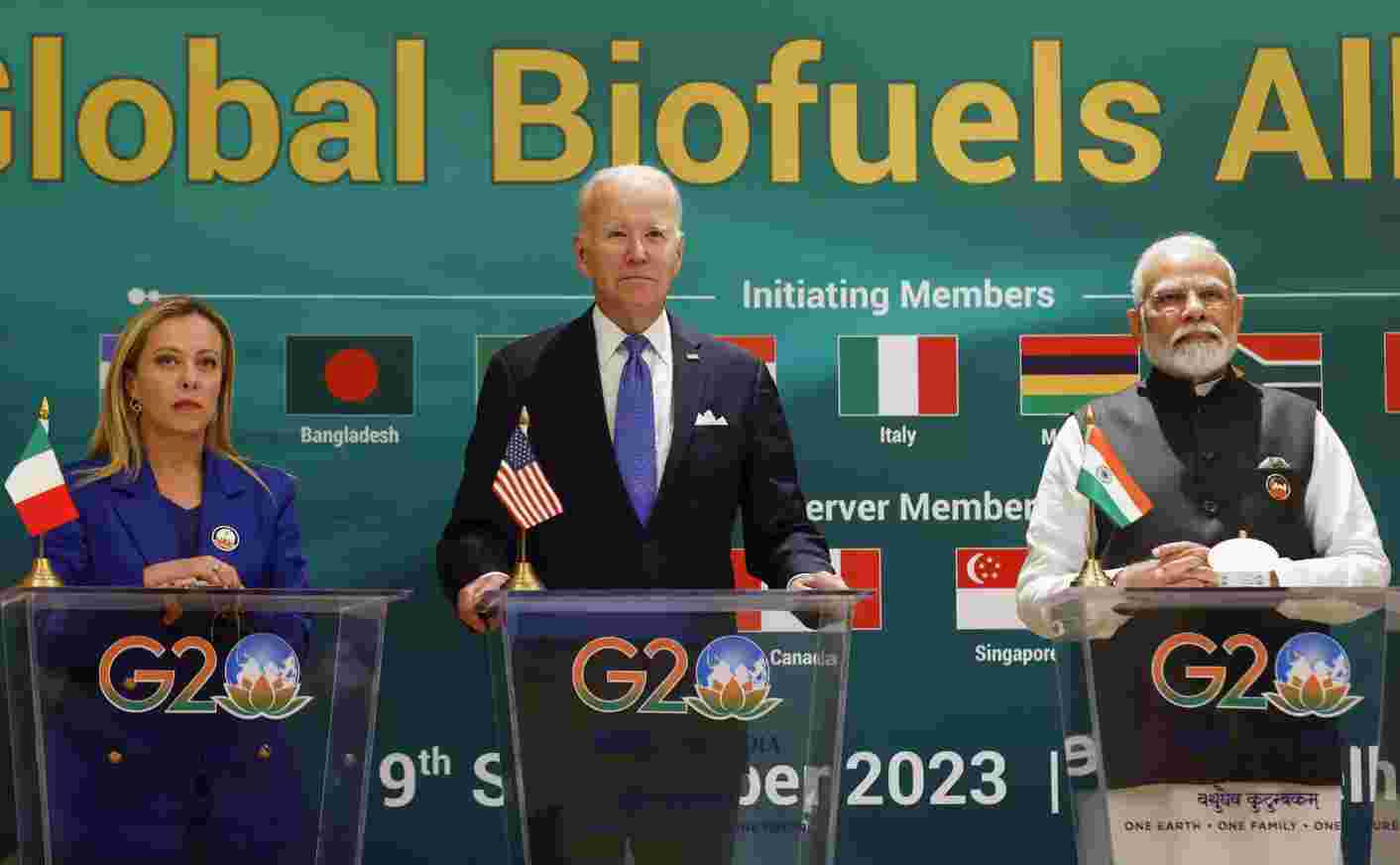- Umang Sagar
- 1 Comment
- International Relations
How the Global Biofuels Alliance Will Transform India’s Energy Landscape?

Introduction
India has taken a monumental step towards a sustainable energy future with the launch of the Global Biofuels Alliance, spearheaded by Prime Minister Narendra Modi at the G20 Summit in New Delhi. This initiative aims to champion the use of eco-friendly biofuels globally, with a visionary goal of blending 20% ethanol with petrol. As India grapples with the challenge of importing over 85% of its crude oil, this alliance holds the potential to not only reduce oil import expenditures but also revolutionize the nation’s approach to renewable energy sources.
The Global Biofuels Alliance: A Collaborative Vision
The Global Biofuels Alliance, a collaborative endeavour involving governments, international organizations, and industries, is committed to driving the widespread adoption of biofuels. Its primary objectives are to ensure a consistent and cost-effective supply of biofuels while advocating for sustainable production methods. This alliance comes as a response to the unfulfilled promise made by developed countries in 2009 to provide $100 billion annually by 2020 to support climate change mitigation in developing nations. India’s leadership in establishing this alliance during its G20 presidency positions it as a crucial advocate for the Global South.
A Parallel to the International Solar Alliance (ISA)
Drawing parallels with the International Solar Alliance (ISA), launched in 2015, India’s biofuels alliance seeks to make clean and affordable energy accessible to all. While the ISA focuses on solar energy, the biofuels alliance is committed to advancing biofuels technology and production methods, paving the way for sustainable and cleaner energy solutions on a global scale.
Benefits of India's Energy Landscape
The launch of the Global Biofuels Alliance marks a significant milestone in the global transition away from fossil fuels. For India, where most crude oil is imported, this alliance represents an opportunity to reduce both the financial burden of oil imports and the nation’s heavy reliance on fossil fuels. By fostering the adoption of biofuels, India can mitigate climate change challenges, reduce air pollution, and create employment opportunities.
Union Minister Nitin Gadkari emphasizes that the Biofuel Alliance aligns seamlessly with India’s vision of ‘Atmanirbhar Bharat’ (self-reliant India). The alliance is set to accelerate India’s existing biofuel programs, such as the Sustainable Alternative Towards Affordable Transportation (SATAT) initiative and the Gobardhan scheme. SATAT focuses on establishing compressed biogas production plants, while the Gobardhan scheme converts waste products into clean energy. These initiatives hold the promise of boosting farmers’ incomes, generating jobs, and fostering holistic development across the country.
Furthermore, the global ethanol market is poised for significant growth, projected to reach $162.12 billion by 2032 from $99.06 billion in 2022, with a compound annual growth rate (CAGR) of 5.1%. India’s proactive involvement in the Global Biofuels Alliance positions it as a key player in this burgeoning market.
Conclusion
The Global Biofuels Alliance, launched under India’s leadership, signifies a ground-breaking endeavour towards sustainable energy. India’s ambitious goals of blending ethanol with petrol and reducing its dependence on fossil fuels are both environmentally commendable and promise substantial economic and societal benefits. By fostering innovation, job creation, and reduced pollution, the alliance sets the stage for a greener and more prosperous future for India and the world.
Top 13 Facts
India’s Prime Minister Narendra Modi launched the Global Biofuels Alliance at the G20 Summit in New Delhi.
The alliance’s primary objective is to promote the adoption of sustainable biofuels worldwide.
It sets an ambitious global target of blending 20% ethanol with petrol, aiming to reduce fossil fuel consumption.
The alliance fosters collaboration among governments, international organizations, and industries.
Its key focus is ensuring a consistent and cost-effective supply of biofuels while advocating for sustainable production practices.
Developed countries had pledged to provide $100 billion annually by 2020 to support climate change initiatives in developing nations but fell short of this promise.
India’s leadership in establishing the alliance is significant, as it advocates for the interests of the Global South.
The Global Biofuels Alliance is likened to the International Solar Alliance (ISA), launched by India in 2015, which aims to make clean and affordable solar energy accessible worldwide.
For India, heavily reliant on importing over 85% of its crude oil, this initiative presents an opportunity to reduce oil import expenses and dependence on fossil fuels.
The alliance aligns with India’s goal of becoming carbon-neutral by 2070, contributing to the nation’s environmental objectives.
Union Minister Nitin Gadkari highlighted that the alliance is beneficial for “Atmanirbhar Bharat” (self-reliant India), as it reduces air pollution, creates jobs, and positions India as a leader in biofuel production and use.
India’s existing biofuel programs, like the Sustainable Alternative Towards Affordable Transportation (SATAT) and the Gobardhan scheme, will receive a boost from the Global Biofuels Alliance.
The global ethanol market is projected to grow significantly, reaching $162.12 billion by 2032, with a compound annual growth rate (CAGR) of 5.1%, making India’s involvement in the alliance even more significant.
How does the Global Biofuels Alliance contribute to India’s efforts to reduce its dependence on imported oil?




[…] Read Article […]